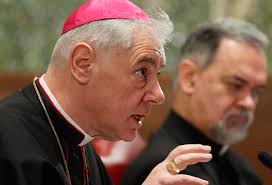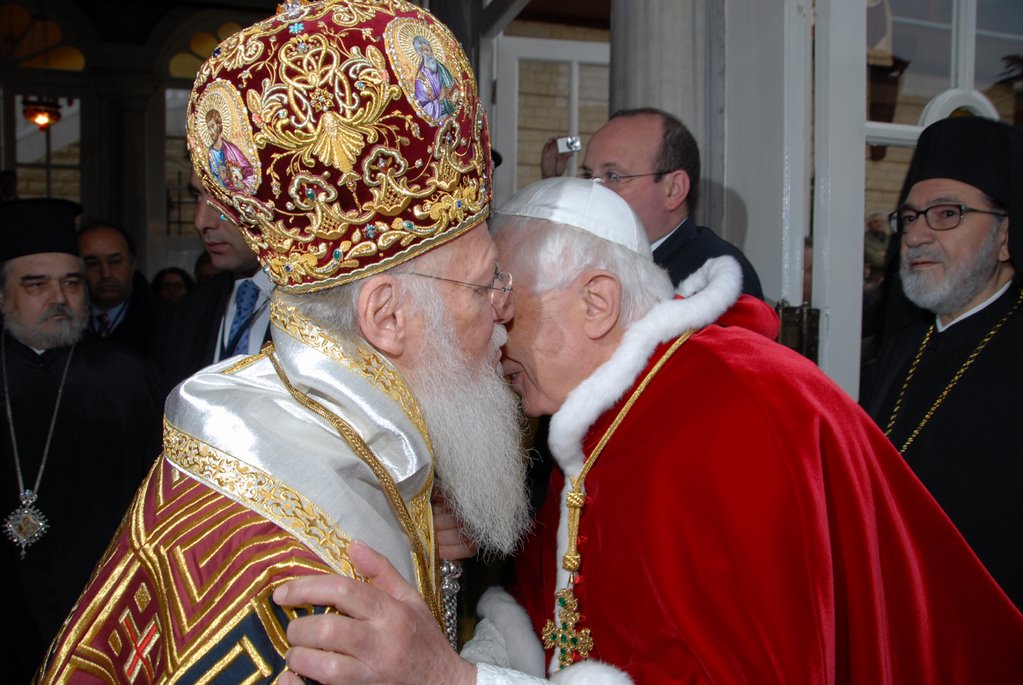
One of my parishioners a nice young single mum was discreetly picking up cigarette ends in the street. She is addicted, she can't afford the habit nowadays. Financially she struggles, so it is about the only pleasure she allows herself, so she suffers the humiliation, hoping other parents don't notice. Never will her children suffer but she does, she goes without food, without new clothes. In the winter when the children are at school the heating goes off. School trips or a torn pair of trousers means she doesn't eat. There was a time when she could work as a cleaner until her own mum died, now she can't afford childcare so she works only when there is school, so now she is looking to resume work after the summer holidays. She can't find any. Their are plenty of people like her throughout the "Rich" North.
The number of those coming to our soup run has gone up recently to about 60/70 each day.
Ever since the appointment of Bishop Gerhard Ludwig Müller of Regensburg as the new Prefect of the CDF, I have been to reading a little of his writings have been on the net and translated into readable English, really, to see if the outrage, of some, over his appointment is justified. To be honest I can't find "errors" in what he writes, unless one foreshortens his argument or quotes him out of context.
His annual month in the slums, his interest in Liberation theology, has been criticised but actually he sees Jesus Christ as the Liberator. The main problem that the
Instruction on Liberation Theology sees with it, is its possible lack of Christ centredness. The Instruction is one of the first documents of Ratzinger's Prefecture, his criticisms will broadened in his later and more important declaration
Dominus Jesus, which is the key document, I think, of both his Prefecture and his Papacy, and all his teaching.
Cardinal Levada, as much as I like him personally was a rather gentle Prefect, radical only in his dissimilarity to his predecessor; Müller seems likely to be a different appointment, more precise, actually as a Ratzinger scholar and editor of his works, more a chip off the old block.
One of the things that seems lacking from "the New Evangelism" but not from the Pope's letters and teaching is the proclamation of the Gospel to the poor. Radical orthodox is meaningless without radical praxis, is a Ratzinger constant, as Deus Caritas says:
25. Thus far, two essential facts have emerged from our reflections:
a) The Church's deepest nature is expressed in her three-fold responsibility: of proclaiming the word of God (kerygma-martyria), celebrating the sacraments (leitourgia), and exercising the ministry of charity (diakonia). These duties presuppose each other and are inseparable. For the Church, charity is not a kind of welfare activity which could equally well be left to others, but is a part of her nature, an indispensable expression of her very being.
b) The Church is God's family in the world. In this family no one ought to go without the necessities of life. Yet at the same time caritas- agape extends beyond the frontiers of the Church. The parable of the Good Samaritan remains as a standard which imposes universal love towards the needy whom we encounter “by chance” (cf. Lk 10:31), whoever they may be. Without in any way detracting from this commandment of universal love, the Church also has a specific responsibility: within the ecclesial family no member should suffer through being in need. The teaching of the Letter to the Galatians is emphatic: “So then, as we have opportunity, let us do good to all, and especially to those who are of the household of faith”
Communism as a economic force has been shown to be bankrupt, JPII and Benedict also point out the significant shortcomings of Capitalism, especially in its commodification of the human person. In the West unemployment and consequently poverty is likely to grow, declining birthrates are going to mean a loss of social support for many, not only the elderly, which many of our southern neighbours are already experiencing. Greece, Italy and Spain cannot afford to keep their elderly pensions, this will spread. Increasingly the cost of the sick will become a serious burden for health services, the problems will spread.
Few political parties in Europe can come up with a "big idea", let alone afford one, hence "Equalities", which is cheap, has emerged as the only idea most politicians seem to buy into.
For Ratzinger the big idea is
Dominus Jesus, the Lord Jesus himself. For Europe, the big political questions should be around the economy. Could it not be that Bishop Gerhard Ludwig Müller, the German Ratzingerian, might actually be someone who might actually be able to insist on not merely radical
doxis but also a radical
praxis? In the light of
Dominus Jesus might not it be timely for a renewed Liberation theology to question and even provide the world with a renewed vision, the vision of St Francis and St John Chrysostom, of the Gospel?





